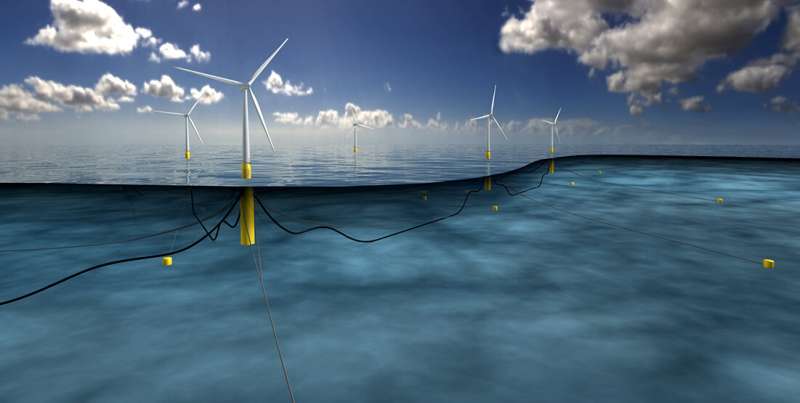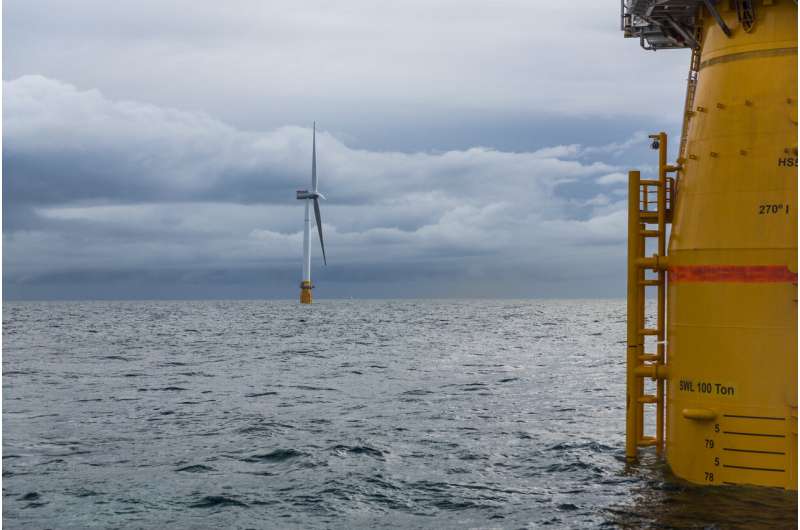Offshore wind offers Norway an opportunity to put its skilled engineers and technical employees from the oil industry to work in a related energy field. Credit: Hywind wind farm illustration, Equinor
Winston Churchill famously remarked "Never let a good crisis go to waste." It's hard to argue that the coronavirus pandemic is a "good" crisis, but it is certainly monumental.
Governments across the globe are racing to save businesses and individuals whose lives and livelihoods have been upended by shutdowns from the coronavirus.
At the same time, the sweeping, painful economic downturn has achieved something that years of climate negotiations have not: huge drops in CO2 and other emissions linked to burning fossil fuels, and changes in the ways companies and individuals go about their daily lives and work.
Fatih Birol, executive director of the International Energy Agency, thinks governments should embrace the chance to build a "Green New Deal" into their bailout packages.
In a recent commentary, he encouraged governments to "put clean energy at the heart of stimulus plans to counter the coronavirus crisis. … The progress this will achieve in transforming countries' energy infrastructure won't be temporary—it can make a lasting difference to our future."
But how likely is this to happen? And will consumers and companies themselves permanently adopt behavioral changes that limit the spread of the disease—and are also good for the planet? We talked to a range of NTNU researchers to see what they think.
A golden ticket
Torbjørn Knutsen is a political scientist at NTNU who says an important factor in answering this question is something called "state capacity." This is not a measure of how much money a state has, but the amount of trust that a population has in its government and thus the ability of government to get its decisions through.
State capacity matters when it comes to planning, especially in the wake of the coronavirus crisis, he said.
A country like Norway, where people trust the ruling government even if they differ with the political leadership, is said to have high state capacity. China also has high state capacity, although because it is a dictatorship, "you don't know if people are obedient to government decrees because they're scared of the government or if they trust the government to do the right thing," he said.
That trust in government should give Norway the freedom to plan for a greener future, he said. In countries like the United States, where distrust in the leadership is high and there is strong division between political parties, change will be more difficult.
Knutsen says the crisis gives governments worldwide a "golden ticket" to plan for change.
"If governments are clever and they are serious in making a shift to greener economies, now is their golden chance—they have gotten a golden ticket," he said. "The virus has done for them what responsible parties have been reluctant to do— cut consumption and many of these polluting industries."
But he is not optimistic that many countries will actually act on this opportunity.
"Once the crisis is over, then governments can plan their recoveries," he said. "But I think stimulating the economy and getting people employed again will be more important than stopping carbon emissions."
The double whammy from oil
Ragnar Torvik is an NTNU economist who has looked at the workings of economies that rely heavily on natural resources, such as oil.
Norway, with its vast investments in North Sea oil, is in a difficult economic position when it comes to oil and the coronavirus, he said, in part because of chance. But that could also push the country closer to embracing greener technologies, he said.
"Oil has gone down a lot in recent weeks. The first main reason is the crisis itself, demand for oil is much lower, and prices have dropped," he said. "This is a temporary situation, and when the economy is back on track, consumption and prices could go up."
But a series of other events make lower oil prices almost certain to persist over time, he said.
New producers, like the United States, are able to produce oil much more cheaply than Norway. At the same time, OPEC, the Organization of Petroleum Exporting Countries, which once had a stranglehold on production and could control prices, no longer has that power.
And in early March, negotiations between OPEC and Russia to prop up oil prices collapsed. Both countries increased their output and oil prices plummeted.
"This might push us in a greener direction, because oil prices are falling," he said. "The Norwegian oil sector has a lot of expertise. Lots of that knowledge could be used for offshore wind power, for example."
Equinor, Norway’s biggest oil company, has already begun to invest in offshore wind projects, such as this project, Hywind Scotland at Buchan Deep. Credit: Øyvind Gravås/Woldcam/Equinor
In its latest of three crisis packages, the Norwegian Storting appeared to agree.
Of three climate related measures, one calls for investments in CO2 capture and storage to be accelerated this autumn. Another confirms the creation of a financing plan for offshore wind. A third allocates NOK 200 million to developing zero emission boats/green shipping.
New ways of meeting
But what about people themselves? Will some of the behavioral changes that we have had to make to stop the coronavirus become permanent?
Francesca Verones is a researcher at NTNU's Industrial Ecology Programme who normally travels widely for her work. Now, like everyone across the globe, she's grounded. And yet, she says, internet technologies have made even big scientific conferences possible online.
"This crisis really shows us how little travel is needed," she said. "I'm not saying no more physical meetings any more, travel helps open your mind, traveling is important, but it shows that there are so many things that can be done online."
Verones had planned to attend the annual meeting of the Society of Environmental Toxicology and Chemistry in Dublin in May. But now, because of the coronavirus, the meeting will be virtual.
"It's a great initiative, instead of just canceling it," she said. "Of course it is a shame to miss out on the physical interaction, but if you are going for the scientific information, you can get it."
Part of the recent Norwegian bail-out packages included support for the three airlines that service Norway—SAS, Norwegian and Wideroe. But policymakers ought think carefully about what these airlines should look like when travel restrictions are lifted, she said.
Verones acknowledges that the crisis has been hard for airlines and their employees, but thinks that the realization that we don't have to travel as much as we have in the past "could be a step to changing the way that we approach travel. It is also a push to getting us to embrace digitalization."
A different story across the Atlantic
NTNU political scientist Jennifer Bailey's research ranges widely, from fisheries policy to comparative politics. But the American-born researcher also keeps a sharp eye on what is happening to the United States, especially in the Trump era.
Perhaps not surprisingly, she's not convinced that the coronavirus crisis will lead to a shift to greener technologies in the United States, mainly because of President Donald Trump. As an example, in the midst of the coronavirus crisis, the Trump administration relaxed US fuel emissions standards for new cars.
She suspects that Nancy Pelosi, leader of the House of Representatives, managed to get some environmental programs into the more-than 800 page law that authorized the USD $2.2 trillion bailout package. However, she is less than optimistic.
"There are probably some Democratic solutions in there," she said. "Unfortunately, it will not add up to a coherent package, and some measures will likely cancel each other out."
Still, the great upheaval in the United States—which during the last week of March and the first week of April saw a record 10 million Americans file for unemployment benefits—does open the door to rethinking how the American government should be structured, she said.
"If we had a US Congress that could work, this might be the time to reconstitute our agencies of government," she said. "There are lessons from the pandemic, and we have a chance to restructure things."
Building on workforce strengths
Bailey's colleague Espen Moe, a political scientist who focuses on energy policy, says that the economic fallout from the coronavirus crisis is more of a shock than a crisis. That means when the shock has ended, it will be tempting for politicians to try to return to the status quo, particularly in the United States.
"Corona is a shock and it will take time to rebuild the economy," he said. "But it is a shock —there is no incentive to change things."
Even so, Moe says, in Norway anyway, politicians have shown that they see the wisdom of adopting green technologies—at least when those technologies can take advantage of workforce strengths.
"Offshore wind can be developed with different kinds of subcontractors whose skills come from the oil sector," he said. "Equinor will not be competitive in fixed wind power—there are already too many companies out there. But for floating wind power, the market is not yet cornered and Norway has a lot of leading expertise."
"This ticks the climate box, the energy box and the industry box—and could have a positive effect," he said.
Provided by Norwegian University of Science and Technology
























